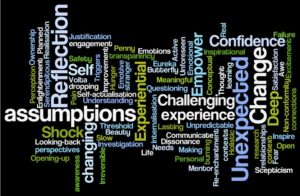While I was training in both hypnosis and NLP, I learned how words can both hurt and inspire. Even a single word can make a huge difference and even help transform a person’s perspective about themselves.
I can remember back then of how the words that were being used around me in my days in the Marines having an influence. Heck, Semper Fi and OOH RAH were so powerful that we were willing to put our life on the line.

Here’s the thing about words, each one are really meaningless until we give them power based on our definition of them. Language is a strange thing. A word in one language could have a completely different meaning. Even within one’s own language, each word can mean something completely different from one person to another. It all depends on the experiences in life and the beliefs created.
“Language creates reality. Words have power. Speak always to create joy.” -Deepak Chopra
When you were a child, didn’t a certain work by your parents or an adult have an impact on you? I know it did for me and many times they were not good. Yet, it was through the power of words from both others and what I told myself that helped me.
Negative words are more abundant than positive ones
There are twice as many negative words versus positive ones. We are literally surrounded by negativity. On TV, at work, when you shop, around your friends and family and more, negativity reigns supreme. Yet, positive emotions help produce more positive results in most circumstances (Fredrickson, 2001 and Fredrickson, et. al., 2008).
“Simply by changing your habitual vocabulary – the words you consistently use to describe the emotions of your life – you can instantaneously change how you think, how you feel, and how you live.” -Tony Robbins
There is a reason why humans tend to use negative words and phrases versus positive ones more often, it’s a survival thing. One study (Vaish, Grossmann and Woodward, 2008) showed that infants tend to approach their environment negatively due to a built-in evolutionary mechanism towards survival.
Even brain studies (Lindquist, et. al 2015) showed humans tend to favor a negative bias versus a positive one. In fact, negative words and phrases tend to have more detailed information associated with them (Garcia, Garas and Schweitzer, 2012) versus positive ones.
How we express our emotions has a direct effect on our health and longevity (Danner, Snowdon and Friesen, 2001).
Think about the metaphors you use in your life. Are they negative or positive? “I have the weight of the world on my shoulders” versus “Life is an adventure.” Both can even affect you physically. Think about the first one. You may even feel your shoulders and body being heavier. The second metaphor may make you feel happier and free.
If you find yourself going negative in your language, then reframe it to something more forward moving. For example, “It’s too hard to do” won’t move you forward. Instead, say “It’s challenging and I can do it” is more powerful and transformational.
Words that are that drain your power will certainly leave you disheartened. Examples are “should, must and have to.” By simply changing them to “want, choose and decide” you’ll empower yourself to success.
“Language shapes our behavior and each word we use is imbued with multitudes of personal meaning. The right words spoken in the right way can bring us love, money and respect, while the wrong words—or even the right words spoken in the wrong way—can lead to a country to war. We must carefully orchestrate our speech if we want to achieve our goals and bring our dreams to fruition.” – Dr. Andrew Newberg, Words Can Change Your Brain
Be self-aware as to the kind of words and language you use throughout each day. Enlist others to help keep you on track. Be observant of the words and language around you too. Television news is really negative and can affect your mindset. Less TV and more inspiring reading will be your regular study.
Sure, you may get frustrated at situations and instead of saying, “I’m devastated and angry” say “I’m frustrated and challenged.” If you find yourself slipping regarding your language, reflect back on it and see how you could have changed it to be more empowering and transformational.
Life is all about adjusting and learning. We are humans and we make mistakes. You’ll never be perfect. You can only give each moment your best effort at the time. That’s including your language. Give yourself a break when you slip up and grow forward.
It’s going to take effort to bring more positive words and language into your life. Since our 300 thousand-year-old brain is formed to survival the wilds of our Paleolithic ancestors, you’re going to have to surround yourself with as much positive information and thinking as possible. This includes how you carry your physical body.
Every single day, write down in a journal three things you are grateful for. Take actions that move you towards a personal mission. And engage in healthy activities that feed your mind, body and spirit. Keep your environment, including the people you associate with the most, as positive as possible.
I wish you a happier, more positive and transformative life!
References:
Danner, D. Snowdon, D. and Friesen, W. (2001) Positive Emotions in Early Life and Longevity: Findings from the Nun Study. Journal of Personality and Social Psychology Vol. 80, No. 5, 804-813. Retrieved from https://www.apa.org/pubs/journals/releases/psp805804.pdf on March 9, 2017
Fredrickson, B. (2001). The Role of Positive Emotions in Positive Psychology. The Broaden-and-Build Theory of Positive Emotions. American Psychologist Vol. 56, No. 3, 218-226. Retrieved from https://www.ncbi.nlm.nih.gov/pmc/articles/PMC3122271/ on March 9, 2017
Fredrickson, B., Cohn, M., Coffey, K., Pek, J. and Finkel, S. (2008). Open hearts build lives: Positive emotions, induced through loving-kindness meditation, build consequential personal resources. Journal of Personality and Social Psychology Vol. 96, No. 5, 1045-1062. Retrieved from https://www.ncbi.nlm.nih.gov/pmc/articles/PMC3156028/ on March 9, 2017
Garcia, D., Garas, A., and Schweitzer, F. (2012) Positive words carry less information than negative words. EPJ Data Science Vol 1. No. 3, 1-12. Retrieved from https://www.sg.ethz.ch/media/publication_files/epjds3.pdf on March 9, 2017
Linquist, K.A., Satpute, A.B., Wager, T.D. Weber, J. and Barrett, L. F. (2015) The Brain Basis of Positive and Negative Affect: Evidence from a Meta-Analysis of the Human Neuroimaging Literature. Cerebral Cortex, 2015, 1-13. Retrieved from http://www.unc.edu/~kal29/docs/Lindquist_Satpute_etal_CC_inpress.pdf on March 9, 2017
Vaish, A., Grossmann T. and Woodward A. (2008) Not all emotions are created equal: The negativity bias in social-emotional development. Psychological Bulletin, Vol. 134(3), 383-403. Retrieved from https://www.ncbi.nlm.nih.gov/pmc/articles/PMC3652533/ on March 9, 2017






Words empower or dis-empower. Use them wisely to inspire others as it empowers the sender and receiver. Great article Bob. Gratitude is key to a joy-filled life. 🙂
Thank you so much Debra and yes, the words we use towards others can have a profound affect on them. It’s important to use them in an empowering way.